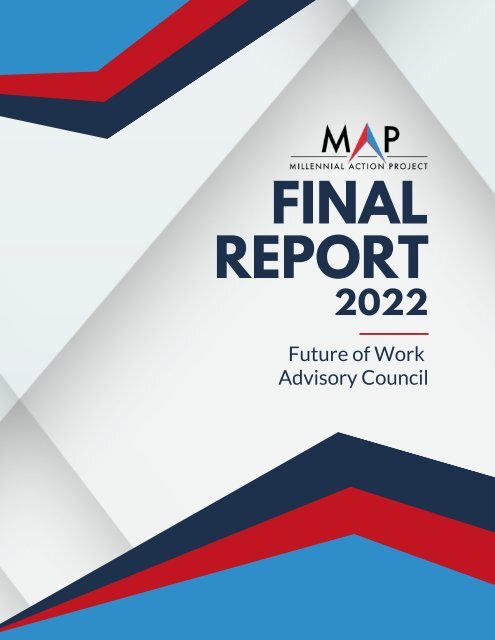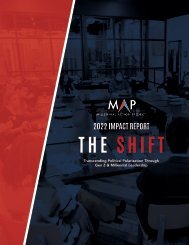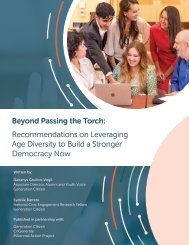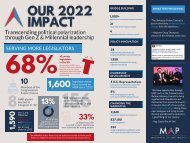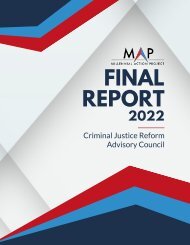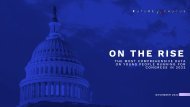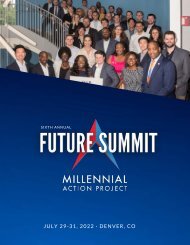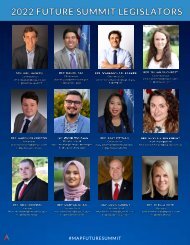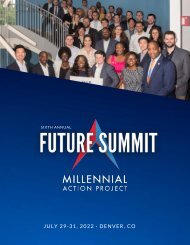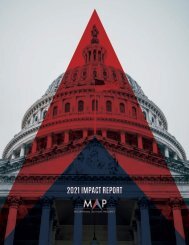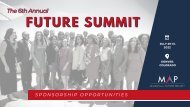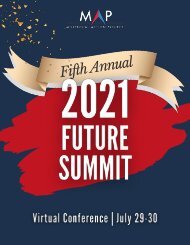Future of Work Advisory Council Final Report
Create successful ePaper yourself
Turn your PDF publications into a flip-book with our unique Google optimized e-Paper software.
FINAL<br />
REPORT<br />
2022<br />
<strong>Future</strong> <strong>of</strong> <strong>Work</strong><br />
<strong>Advisory</strong> <strong>Council</strong>
Table <strong>of</strong> Contents<br />
01<br />
Foreword p 03<br />
02<br />
Meet the <strong>Advisory</strong> <strong>Council</strong> Members<br />
p 04<br />
03<br />
Introduction<br />
p 05<br />
04<br />
Talent Retention<br />
p 06<br />
05<br />
Broadband Development<br />
p 08<br />
06<br />
Housing and Cost <strong>of</strong> Living<br />
p 10<br />
07<br />
Conclusion p 11
0 3<br />
Foreword<br />
Foreword<br />
For the past three years, the American economy has been challenged by a series <strong>of</strong> crises<br />
that have left many Americans, and young Americans in particular, concerned over their<br />
future prospects. From the COVID-19 pandemic to the challenges <strong>of</strong> inflation and cost-<strong>of</strong>living<br />
that have come in the aftermath, the future <strong>of</strong> work in this country is rife with<br />
uncertainty. It was for this reason that the Millennial Action Project, in partnership with<br />
the Omidyar Network, called together its first <strong>Future</strong> <strong>of</strong> <strong>Work</strong> <strong>Advisory</strong> <strong>Council</strong><br />
(FOWAC) to bring together up-and-coming legislative policy leaders in this field and<br />
counter the uncertainty <strong>of</strong> these past few years with new and dynamic economic<br />
solutions.<br />
If anything has been made clear in these challenging times, it is that many Americans<br />
simply cannot afford to wait while politicians get bogged down in the same old partisan<br />
debates over economic policy. This factionalism only works to increase cynicism and<br />
distrust <strong>of</strong> the political process while ordinary people face either a rise in unemployment<br />
or an inflation-induced decline in wage values. In order to bring an end to this destructive<br />
cycle, elected <strong>of</strong>ficials need to make clear to their constituents how they will work<br />
together to improve livelihoods and ensure economic opportunities.<br />
The <strong>Future</strong> <strong>of</strong> <strong>Work</strong> <strong>Advisory</strong> <strong>Council</strong> (FOWAC) was brought together for this exact<br />
purpose. Not only were these leaders selected for their perspectives as young legislators,<br />
they were also selected for the determination and expertise they had demonstrated in<br />
promoting the future <strong>of</strong> work in their most recent respective legislative sessions. As part<br />
<strong>of</strong> this council, the FOWAC members shared with us at MAP their perspectives on talent<br />
retention, broadband development, and housing and cost-<strong>of</strong>-living policies.<br />
These policy areas, while far from the only major areas concerning the future <strong>of</strong> work,<br />
represent the prime where these young legislative leaders have made their mark. This<br />
report delves into some <strong>of</strong> the specifics <strong>of</strong> the proposals these legislators have made<br />
within these issue areas. They also represent a firm baseline for the perspective these<br />
legislators and others will be taking toward the future <strong>of</strong> work as preparations for the<br />
2023 legislative session begins nationwide.<br />
On behalf <strong>of</strong> the Millennial Action Project, I would like to thank<br />
the members <strong>of</strong> the <strong>Future</strong> <strong>of</strong> <strong>Work</strong> <strong>Advisory</strong> <strong>Council</strong> for the time<br />
they have taken to share their ideas with our organization and<br />
their efforts to build a collaborative space for this important<br />
conversation at a time when polarization seems intractable. It is<br />
this leadership that <strong>of</strong>fers a brighter picture for the future <strong>of</strong> not<br />
just America’s economy, but our democracy as well.
Meet the Members<br />
Meet the <strong>Future</strong> <strong>of</strong> <strong>Work</strong><br />
<strong>Advisory</strong> <strong>Council</strong><br />
The <strong>Future</strong> <strong>of</strong> <strong>Work</strong> <strong>Advisory</strong> <strong>Council</strong> assembled in August 2022 with the inaugural<br />
meeting <strong>of</strong> the council on Tuesday, September 13th. The members <strong>of</strong> the FOWAC were<br />
invited by MAP due to the bipartisan leadership they had shown in economic policy within<br />
their states’ most recent legislative sessions. The legislators shared in the FOWAC’s<br />
meetings their respective policy proposals and approaches to problem solving.<br />
This report details approaches to economic policy identified by members <strong>of</strong> the <strong>Future</strong><br />
<strong>of</strong> <strong>Work</strong> <strong>Advisory</strong> <strong>Council</strong> in the areas <strong>of</strong> talent retention, broadband development,<br />
and housing policy. State legislator’s participation from in MAP’s <strong>Future</strong> <strong>of</strong> <strong>Work</strong><br />
<strong>Advisory</strong> <strong>Council</strong> does not imply individual support for any or all <strong>of</strong> the methods<br />
identified in this document.<br />
<strong>Council</strong> Members<br />
Rep. Jennifer Bacon (D-CO)<br />
Co-Chair<br />
Rep. Judd Strom (R-OK)<br />
Co-Chair<br />
Rep. Matthew Gambill (R-GA)<br />
Rep. Shevrin Jones (D-FL) Rep. Jeremy Gray (D-AL) Rep. Nick Hoheisel (R-KS)
0 5<br />
Introduction<br />
Introduction<br />
The foundations for the <strong>Future</strong> <strong>of</strong> <strong>Work</strong> <strong>Advisory</strong> <strong>Council</strong> came from MAP’s <strong>Future</strong> <strong>of</strong><br />
<strong>Work</strong> Listening Tour which was conducted from late 2021-early 2022 with support from<br />
the Omidyar Network. MAP staff spoke with legislators from 11 different states who each<br />
<strong>of</strong>fered their unique and insightful perspectives on the changing nature <strong>of</strong> America’s<br />
economy, and where they felt there were the greatest opportunities for bipartisan<br />
collaboration.<br />
Over the course <strong>of</strong> the conversations, three distinct overarching topics emerged as key<br />
focal points for legislators:<br />
1. Retaining talent and employees within their jurisdictions;<br />
2. Developing broadband technologies and infrastructure;<br />
3. Finding ways to reduce and manage the costs <strong>of</strong> housing and other necessities despite<br />
increasing inflation.<br />
The FOWAC’s creation allowed for more intensive conversations on these policy areas,<br />
the findings <strong>of</strong> which are reflected in this report.
Talent Retention<br />
Talent Retention<br />
During the inaugural meeting <strong>of</strong> the FOWAC, the group focused on talent retention. Over the course <strong>of</strong> the <strong>Future</strong> <strong>of</strong><br />
<strong>Work</strong> Listening Tour, many legislators listed the negative impacts <strong>of</strong> “brain drain” – the process in which state talent is<br />
drawn away from rural areas because <strong>of</strong> factors such as educational and economic opportunities elsewhere. The<br />
legislators noted that this phenomenon is one <strong>of</strong> the largest economic challenges facing their respective communities.<br />
Many further pointed out the importance <strong>of</strong> countering brain drain specifically because <strong>of</strong> its impact on young people.<br />
Education Funding<br />
Educational opportunities were also mentioned by the legislators as a marquee factor in<br />
attracting talent to their jurisdictions. The importance <strong>of</strong> education funding was in<br />
particular emphasized by Rep. Bacon <strong>of</strong> Colorado, who herself had previously been a<br />
teacher. She discussed the important need for legislatures to match educational talent<br />
with the resources needed for that talent to thrive.<br />
These concerns were further echoed by legislators regarding the funding <strong>of</strong> career,<br />
technical, and vocational education, as well as a growing tendency <strong>of</strong> states to <strong>of</strong>fer merit<br />
funds and scholarships to wealthy outside talent, divesting from homegrown talent.<br />
Throughout these points, a common theme emerged among the legislators that while all<br />
agreed funding education was <strong>of</strong> key importance, equally important was ensuring that the<br />
resources dedicated to education were distributed in a fair and efficient manner.<br />
Promoting Business Development<br />
All legislators on the FOWAC agreed that finding avenues to support and promote the<br />
development <strong>of</strong> businesses big and small would be another critical factor in the success <strong>of</strong><br />
talent retention in their communities. The legislators themselves came from communities<br />
that had varying degrees <strong>of</strong> economic development, which led to differences in<br />
perspective as to the best manner to go about ensuring business development.<br />
Some major concerns brought up by legislators included inequality <strong>of</strong> resources,<br />
particularly between rural or majority-minority communities against wealthier urban or<br />
suburban jurisdictions. These included factors such as the “digital divide” in internet<br />
access, slow development <strong>of</strong> remote work opportunities that could benefit regions outside<br />
major metropolitan areas, and the ongoing challenges <strong>of</strong> workplace disruptions in the<br />
aftermath <strong>of</strong> the COVID-19 pandemic.
0 7<br />
Talent Retention<br />
American Rescue Plan Act Funding<br />
The severe economic damage <strong>of</strong> the COVID-19 pandemic saw the federal government<br />
respond with an unprecedentedly rapid series <strong>of</strong> economic relief measures passed over<br />
the course <strong>of</strong> two presidential administrations. Among the largest <strong>of</strong> these measures was<br />
the American Rescue Plan Act (ARPA) which passed in early 2021 and signed into law by<br />
President Joe Biden. The law sent relief money to state governments who subsequently<br />
had the discretion to use large segments <strong>of</strong> it as they saw fit.<br />
The legislators <strong>of</strong> the FOWAC discussed how their states had spent these ARPA funds in<br />
their most recent sessions. In particular, efficiency concerns were frequently brought up.<br />
Points were also made regarding whether or not it was truly helpful for some states to<br />
spend ARPA funds on varying facilities such as prisons that did not provide for consistent<br />
economic opportunities over the long term.<br />
Family Development and Support<br />
The final major discussion factor within the realm <strong>of</strong> talent retention was the role that<br />
states could play in supporting and attracting family units given their increased economic<br />
burdens. Challenges faced by young families, such as debt, work-life balance, and childcare<br />
funding were all cited as major areas where states could improve their policies to make<br />
their jurisdictions more inviting to new families.<br />
The legislators <strong>of</strong> the FOWAC gave these concerns extra attention due to the ongoing<br />
burdens <strong>of</strong> housing and cost-<strong>of</strong>-living among young people. Proposed solutions from the<br />
legislators included tax credits for childcare, and addressing various sources <strong>of</strong> high debt<br />
such as education and medical debt.
Broadband<br />
Broadband Development<br />
The promotion <strong>of</strong> internet and broadband development has been a major point <strong>of</strong> policy contention since the<br />
popularization <strong>of</strong> the internet in the 1990s. In recent years, while internet access has become near-ubiquitous<br />
nationwide, gaps have remained particularly in rural and tribal areas, and even some majority-minority communities in<br />
various cities. On Tuesday, October 4th, the second meeting <strong>of</strong> the FOWAC’s legislators featured a discussion regarding<br />
their views on broadband development policy, to address the state legislatures’ role and impact on this very issue.<br />
Rural and Tribal Broadband<br />
Closing the digital divide between rural and urban areas has attracted major attention<br />
from both the federal and state-level governments in the past few years. In November<br />
2021, Congress passed the Infrastructure Investment and Jobs Act, also known as the<br />
Bipartisan Infrastructure Law (BIL), that included major provisions specifically dedicated<br />
to ensure universal access to broadband across the nation.<br />
It was unanimously agreed by the legislators that reducing this digital divide should be a<br />
major focus <strong>of</strong> their respective legislatures. This sentiment was echoed most strongly by<br />
Oklahoma Rep. Logan Phillips, a guest <strong>of</strong> co-chair Rep. Strom, who was a major leader in<br />
promoting rural broadband funding in the Sooner State. From Rep. Phillips’ experience, he<br />
said in order to ensure broadband the legislature had to identify on the map where digital<br />
infrastructure was located, and where the gaps remained. From there, the state consulted<br />
extensively with community leaders, tribal leaders, academic experts, and other key<br />
stakeholders to develop a comprehensive plan to expand access to every corner <strong>of</strong> the<br />
state. His experience was an inspiration to many listening in the meeting.<br />
Digital Infrastructure Development<br />
Alongside the legislators’ focus to ensure access to broadband was a focus to develop the<br />
necessary infrastructure and production capabilities needed to physically service their<br />
constituents with digital access. A common sentiment expressed by the FOWAC members<br />
was concern over the degree to which the production and supply chains <strong>of</strong> critical digital<br />
infrastructure had been increasingly <strong>of</strong>fshored in prior years.<br />
Over the course <strong>of</strong> their conversation, many <strong>of</strong> the FOWAC’s legislators agreed that<br />
finding methods to promote the development <strong>of</strong> this infrastructure was <strong>of</strong> vital<br />
importance. Many <strong>of</strong> the legislators placed the greatest emphasis on the need for<br />
domestic semiconductor production to counter potential geopolitical instability given that<br />
most semiconductor manufacturing facilities are currently located in Taiwan. Rep. Bacon<br />
summarized these thoughts with the perspective that legislatures should start treating<br />
the importance <strong>of</strong> digital infrastructure “to the same degree as electricity, gas, and water.”
0 9<br />
Broadband<br />
Telehealth and Remote <strong>Work</strong><br />
The FOWAC also emphasized the need to promote the use <strong>of</strong> these technological<br />
capabilities. Particularly after the COVID-19 pandemic, important new internet services<br />
such as telehealth and remote work grew in popularity. These are now key services that<br />
may not be available for many Americans in urban and rural communities.<br />
There was widespread agreement among the FOWAC’s legislators that telehealth was a<br />
vital new service that needs support from policymakers. Rep. Hoheisel (R-KS) was<br />
particularly emphatic on the assistance that this service could provide in rural areas. The<br />
legislators were also optimistic over the possibilities <strong>of</strong>fered by remote work, but<br />
questions remained as to the degree or capability that state governments had in<br />
addressing the growth <strong>of</strong> that field.
Housing<br />
Housing and Cost <strong>of</strong> Living<br />
Across the nation, many Americans have faced rising housing costs and costs in other fields due to the growing impact <strong>of</strong><br />
inflation. This predicament has led to major concerns, especially among young Americans. Finding ways in which<br />
legislatures may work to provide assistance in this field was the focus <strong>of</strong> the third and final FOWAC meeting on Tuesday,<br />
October 18th.<br />
Combatting Housing Costs<br />
As a result <strong>of</strong> the rapid growth in housing costs, there has been a corresponding increase<br />
in homelessness rates. A point that resonated the legislators was how homelessness was<br />
an issue that transcended community lines, and yet was still being discussed as if it were<br />
only a local issue. Many legislators pointed out that it was not only single-family housing<br />
that was rapidly growing in cost, but that rental costs in apartments were dramatically<br />
increased as well in the aftermath <strong>of</strong> the COVID-19 pandemic.<br />
To combat the growing impact <strong>of</strong> housing costs, some legislators noted efforts simply to<br />
ramp up subsidies for housing in order to promote more immediate cost reductions, while<br />
others cautioned that these policies could simply pad developer pr<strong>of</strong>its and that<br />
alternatives existed in direct government intervention through policies such as limited<br />
rent control.<br />
Impact <strong>of</strong> Interest Rate Increases<br />
To combat inflation, the Federal Reserve has adopted a policy <strong>of</strong> aggressively increasing<br />
national interest rates with the goal <strong>of</strong> bringing down consumer spending levels, and with<br />
those the level <strong>of</strong> inflation. One major effect <strong>of</strong> this aggressive policy has been an increase<br />
<strong>of</strong> costs to homeowners as well as those with rent or mortgages who have born the brunt<br />
<strong>of</strong> this increase in rates.<br />
Many legislators in the meeting expressed concern over the degree to which the interest<br />
rate increases would have on ordinary Americans’ finances. Some optimism was expressed<br />
in the meeting that higher rates would in-turn increase housing options that people<br />
qualify for, particularly mortgages, but the policymakers will have to wait and see if that<br />
really is the case.
1 1<br />
Housing<br />
Other Ways to Fight Inflation<br />
Outside <strong>of</strong> housing costs, inflation has also made a major impact on a number <strong>of</strong> fields<br />
from energy costs to grocery costs. In August 2022, more federal aid to help bring<br />
inflation under control was passed through the Inflation Reduction Act <strong>of</strong> 2022 (IRA),<br />
which contained major provisions to help increase federal revenue as well as new policies<br />
with the goal <strong>of</strong> bringing down other economic costs, particularly in the energy sector.<br />
Given the recency with which this bill was passed into law, many legislators on the call<br />
were taking a wait-and-see approach to its provisions, especially since several needed to<br />
familiarize themselves with the bill’s provisions relating to state funding. Major hopes<br />
centered on possible efforts to bring down energy costs, as well as the finding ways to<br />
reduce the costs that states have had to pay out <strong>of</strong> their own c<strong>of</strong>fers in the past two years.<br />
Conclusion<br />
The future <strong>of</strong> work in the United States is filled with exciting possibilities, but also many<br />
challenges. As both millennials and generation Z determine how to ensure a sound and<br />
secure economic future, the time is more critical than ever for America’s elected <strong>of</strong>ficials<br />
to consider America’s future generations as they consider new economic policies.<br />
In this regard, leaders such as MAP’s <strong>Future</strong> <strong>of</strong> <strong>Work</strong> <strong>Advisory</strong> <strong>Council</strong> are all the more<br />
critical. Together, them and rising generations can ensure they have a place at the table,<br />
not just with the economy, but within the American Dream as well.
1 2<br />
F o l l o w M A P<br />
WWW.MILLENNIALACTION.ORG<br />
@MACTIONPROJECT<br />
@MACTIONPROJECT<br />
@MILLENNIALACTIONPROJECT<br />
/MILLENNIALACTIONPROJECT<br />
@MILLENNIALACTIONPROJECT


